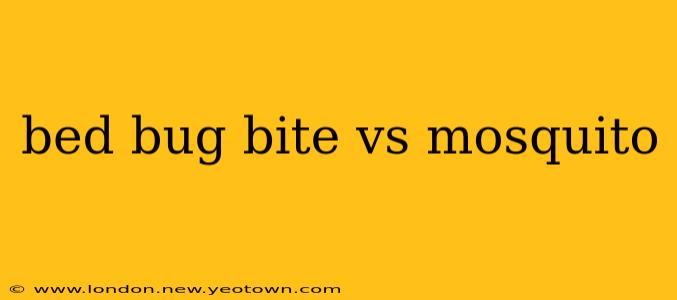Identifying the culprit behind those itchy welts can be tricky. Mosquitoes and bed bugs are both notorious for their biting habits, leaving behind similar-looking reactions on the skin. However, understanding the key differences in their bites can help you pinpoint the pest and take appropriate action. This guide will explore the nuances of bed bug bites versus mosquito bites, allowing you to effectively distinguish between the two and implement the right preventative measures.
Key Differences: Bed Bug Bites vs. Mosquito Bites
While both leave itchy red bumps, several distinguishing factors help differentiate bed bug bites from mosquito bites.
Appearance and Location
-
Bed Bug Bites: Often appear in a line or cluster, sometimes described as a "breakfast, lunch, and dinner" pattern. This is because bed bugs typically feed multiple times during a single night. They usually target exposed skin while you're asleep, often on the arms, legs, neck, and face. However, they can bite anywhere on the body. The bites themselves are usually small, red, and raised welts.
-
Mosquito Bites: Typically appear as single, itchy bumps, although multiple bites are common. Mosquitoes are opportunistic biters and are less likely to concentrate their feeding in one area. They tend to bite exposed skin, but their reach is less predictable than bed bugs.
Reaction and Symptoms
-
Bed Bug Bites: Reactions vary widely among individuals. Some experience only mild itching and redness, while others may develop significant swelling, blistering, or even an allergic reaction. The bites may be intensely itchy and can last for several days, even weeks. Secondary infections can occur if bites are scratched.
-
Mosquito Bites: Similar to bed bug bites, the reaction varies by individual. A typical reaction is a small, red, itchy bump that subsides within a few days. Some individuals may experience more pronounced swelling and itching. Allergic reactions are rare, but possible.
Timing of Bites
-
Bed Bug Bites: Typically occur at night while you are asleep, as bed bugs are nocturnal feeders.
-
Mosquito Bites: Can occur at any time of day or night, depending on the mosquito species and their activity patterns.
Finding the Culprit
-
Bed Bug Bites: To confirm a bed bug infestation, carefully inspect your mattress, bedding, box spring, and surrounding areas for small, dark-colored insects or their fecal spots (tiny black dots). You might also see shed skins.
-
Mosquito Bites: Mosquitoes are usually found near standing water or areas with ample vegetation. Inspect your surroundings for potential breeding grounds.
Beyond the Bite: What to Do
Regardless of whether you've been bitten by a bed bug or a mosquito, itching can be intense. Here's what you can do:
- Resist scratching: Scratching can break the skin, leading to infection.
- Apply a cool compress: This can help reduce swelling and itching.
- Use over-the-counter hydrocortisone cream or calamine lotion: These can provide relief from itching.
- Take an antihistamine: Oral antihistamines can help reduce allergic reactions and itching.
Professional Help
If you suspect a bed bug infestation, it's crucial to seek professional pest control services. Bed bugs are notoriously difficult to eliminate, and professional treatment is often necessary to prevent a widespread infestation. If you experience a severe allergic reaction to either bed bug or mosquito bites, consult a doctor.
This information is for general knowledge and does not constitute medical advice. Always consult a healthcare professional for diagnosis and treatment.

